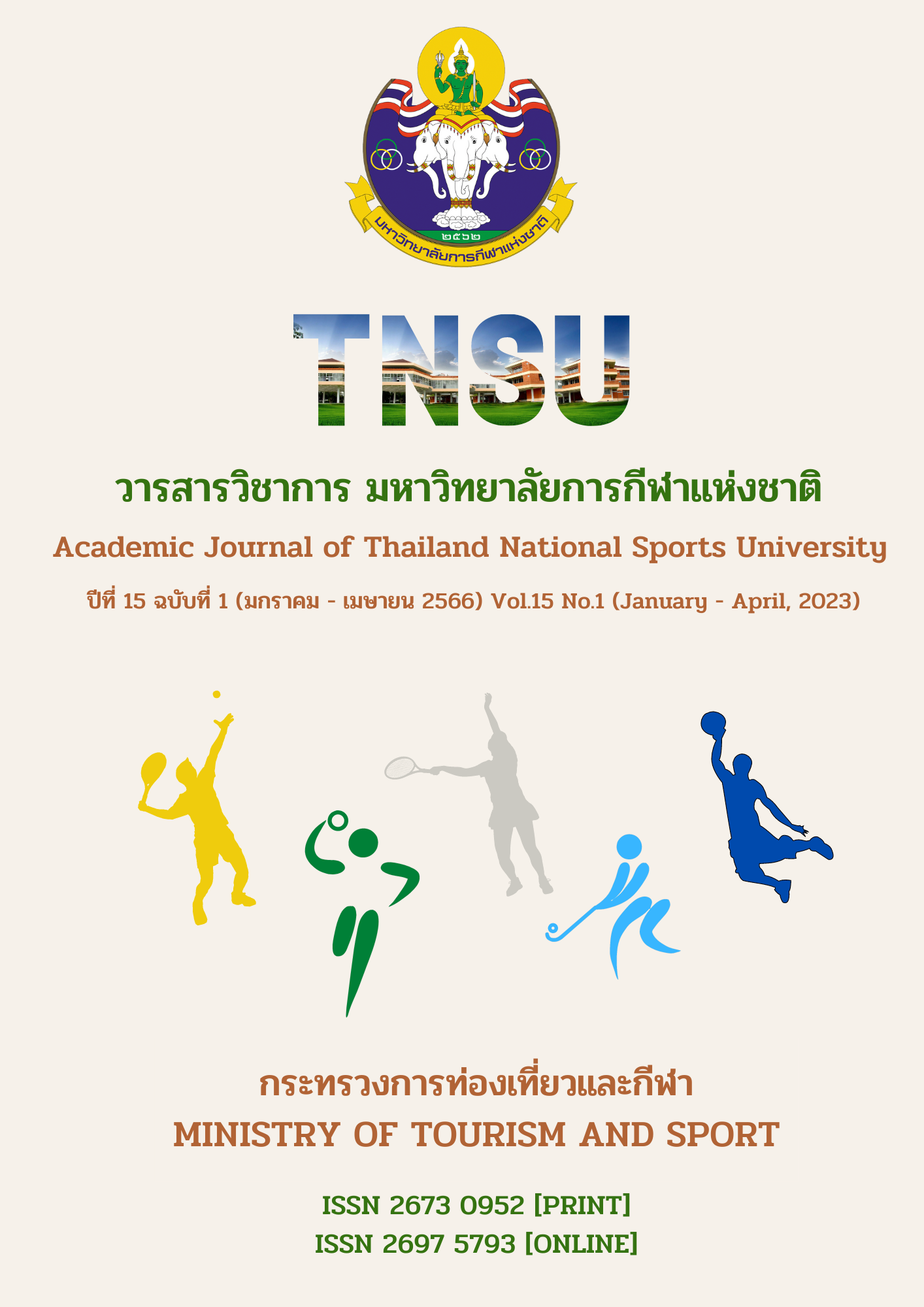EFFECTS OF PHYSICAL ACTIVITY PROGRAM BY APPLYING SOCIAL AND EMOTIONAL LEARNING TO PROMOTE MENTAL HEALTH AND SOCIAL WELL - BEING OF LOWER SECONDARY SCHOOL STUDENTS
Main Article Content
Abstract
The purpose of this research was to study the effects of physical activity program by applying social and emotional learning for promoting mental health and social well - being of lower secondary school students. The subjects consisted of 60 lower secondary school students, divided into 2 groups, 30 students in the experimental group, and 30 students in the control group. The research instruments were the physical activity program by applying social and emotional learning consisting of eight activities with IOC 0.98, the mental assessment form with IOC 0.96, reliabilities 0.95, and the social well - beings assessment form with IOC 0.81, reliabilities 0.96 the research period was 8 weeks, 3 days per week, 1 hour per day. The data were analyzed using mean, standard deviation and t - test. The research findings were as follows: the mean scores of mental and social well-beings of the experimental group students after the experiment were statistically significant higher than before at the .05 level, and the mean scores of mental and social well - being of the experimental group students after the experiment were statistically significant higher than the control group at the .05 level. This showed that the physical activity program by applying social and emotional learning had an effect on the mental health and social well - beings of lower secondary school students.
Article Details

This work is licensed under a Creative Commons Attribution-NonCommercial-NoDerivatives 4.0 International License.
The published article is a copyright of the Academic Journal of Thailand National Sports University. The passage appeared in each article in this academic journal is a perspective of each author which is not related to the journal. Each author is required to be responsible for all components of his/her own article. If there are any mistakes, each author must be responsible for those mistakes on his/her own.
References
CASEL. (2016). Social and Emotional Learning. Collaborative for Academic, Social and Emotional Learning.
Davis Tchiki. (2019). What is well - being? definition, type and well - being skills. Psychology Today.
Denham. (2012). Social - Emotional learning profiles of preschooler’s early school success, Learning and Individual Differences. Elsevier Amsterdam, Netherlands.
Jintana Sarayuthpitak. (2018). School health programs. Bangkok: Printing Press of Chulalongkorn University.
Kamonchanok Kongcharoen. (2017). Enhancement of psychological well - being among university students through humanistic growth group (Master’s thesis), Chiang Mai University.
Kalyanee Sitthiwut. (2014). Learning participatory activities and group process to construct social well - being for student at Ban Numkong School, Mueang District, Nan Province (Master’s thesis), Chiang Mai University.
Kannika Kamthorn. (2014). The result of social and emotional learning developing program of Mattayomsuksa two students in Satri Wat Rakhang School. (Master’s thesis), Srinakharinwirot University.
Kids matter. (2010). Information for parents carers and school staff: Component 2: Social and emotional learning for students. Canberra, ACT: Australian Government Department of Health and Ageing.
Ministry of Tourism & Sports. (2017). Sixth national sports development plan (2017 - 2021). Bangkok: Office of Printing Affairs, the War Veterans Organization of Thailand.
National association of school psychologists. (2019). About school psychology. East West Highway, Suite 402, Bethesda. Retrieved from https://www.nasponline.org/
Office of the National Economic and Social Development Council. (2017). 12th national economic and social development plan (2017-2021). Bangkok: Office of the Prime Minister.
Partoa & Besharatb. (2011). The direct and indirect effects of self - efficacy and problem solving on mental health in adolescents: Assessing the role of coping strategies as mediating mechanism. SciVerse ScienceDirect, Procedia Social and Behavioral Sciences.
Phanom Ketman. (2015). How to promote mental health helps relieve stress. Retrieved from http://www.thaihealth.or.th/microsite/content/5/ncds/181/28514
Rangsirat Nilrat. (2010). The development of a social and emotional learning program for fourth to sixth grade students (Master’s thesis), Chulalongkorn University.
Shirley Adam. (2016). Social and Emotional Learning Skills: SEL. World Economic Forum.
Sirachach Junrussamee, & Jintana Sarayuthpitak. (2017). Effects of exercise program based on protection motivation theory on decreasing stress of university students. Journal of Education Studies, 45(4), October - December, 207 - 233.
Suradate Prayoonsak. (2017). Structural causal relationships of antecedent factors of becoming football fans of the Thailand Premier League Club and Fan behavior influencing social well - being and mental health (Doctoral dissertation), Srinakharinwirot University.
Thai Health Promotion Foundation. (2020). Thai Health Direction 2020. Bangkok: Thai health watch2020.
The Australian Psychological Society. (2011). Stress and wellbeing in Australia in 2011: A state of the nation survey. APS Collins Street Melbourne VIC.
The Central Data System in Education. (2020). Report data: Percentage of students per school - age population by school year 2020 level. Retrieved from http://www.mis.moe.go.th


